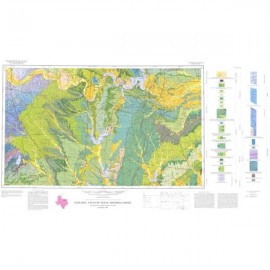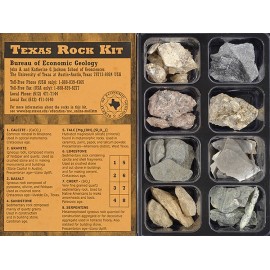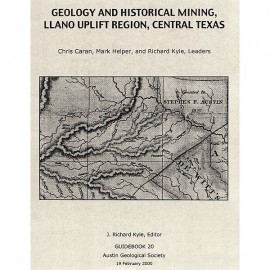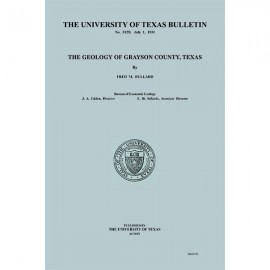Geological Circulars
-
Books & Reports
- Reports of Investigations
- Guidebooks
- Udden Series
- Geological Circulars
- Down To Earth
- Atlases of Major Oil and Gas Reservoirs
- Texas Memorial Museum Publications
- Environmental Geologic Atlas of the Texas Coastal Zone
- Mineral Resource Circulars
- Other Reports
- Seminars and Workshops
- Handbooks
- Submerged Lands of Texas
- Symposia
- Annual Reports
- Open File Reports
-
Maps & Cross Sections
- Thematic Maps
- Miscellaneous Maps, Charts & Sections
- Geologic Atlas of Texas
- STATEMAP Project Maps
- Geologic Quadrangle Maps
- Cross Sections
- Highway Geology Map
- Energy and Mineral Resource Maps
- Shoreline Change and Other Posters
- Wilcox Group, East Texas, Geological / Hydrological Folios
- Bouguer Gravity Atlas of Texas
- River Basin Regional Studies
- Featured Maps
- Posters
- Teachers & the Public
-
Geological Society Publications
- Gulf Coast Association of Geological Societies
- Alabama Geological Society
- Austin Geological Society
- Corpus Christi Geological Society
- Houston Geological Society
- Lafayette Geological Society
- Mississippi Geological Society
- New Orleans Geological Society
- South Texas Geological Society
- GCS SEPM Publications
- Historic BEG & UT Series
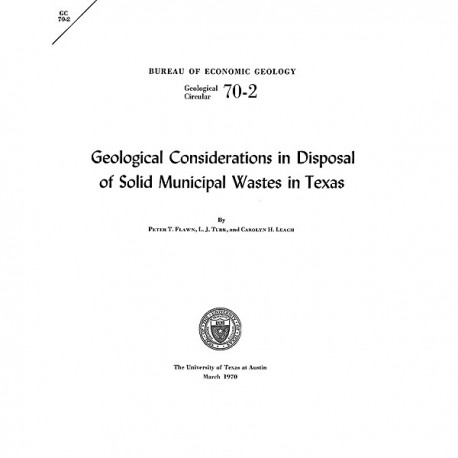
Geological Considerations in Disposal of Solid Municipal Wastes in Texas
GC7002
A free, digital version of this publication can be found on: Texas ScholarWorks
GC7002. Geological Considerations in Disposal of Solid Municipal Wastes in Texas, by P. T. Flawn, L. J. Turk, and C. H. Leach. 22 p., 1970. ISSN: 0082-3309. Print.
To purchase this publication as a PDF download, please order GC7002D.
From the Introduction
In the United States the average citizen produces 6 to 8 pounds of solid wastes per day--this includes his personal contribution plus his pro-rata share of industrial and agricultural wastes. A city of 200,000 to 300,000 people is faced with collecting, transporting, and disposing of about 400 tons to 500 tons of solid wastes every day. This is the amount produced by the residents and small businesses--it does not include the wastes from big industrial operations. Costs of solid waste disposal range from $10 to $30 per ton depending on local labor costs, the distance the material must be transported, and the costs of acquisition and operation of disposal sites. In Texas, cost of landfill operations alone averages $1.10 per ton (Gazda and Malina, 1969, p. 23). The practice of open burning of wastes at the disposal site has been discontinued in many areas because of air pollution control legislation. This increases the volume of material that must be buried. In some areas the volume of solid wastes is reduced by high-temperature incinerators prior to ultimate disposal, in others controlled burning of wastes produces by-product steam.
Keywords: waste disposal, Texas, United States
CONTENTS
Introduction
Sanitary landfill
Texas Solid Wastes Disposal Act of 1969
Geological formations suitable for sanitary landfills near major Texas cities
Cities of the Black Prairie--Austin, Dallas, San Antonio, Waco
Cities of the coastal margin- -Beaumont, Brownsville, Corpus Christi, Galveston, Harlingen, Houston, Port Arthur, Texas City
Cities of the High Plains--Amarillo, Lubbock, Abilene
Edinburg-McAllen-Pharr
El Paso
Fort Worth
Laredo
Midland-Odessa
San Angelo
Sherman-Denison
Texarkana
Tyler
Wichita Falls
References
ILLUSTRATIONS
Figures 1-4. Surface waste disposal and ground-water contamination
- Perched water table, near stream
- Low permeability host, high water table
- Low permeability host, moderate climate
- Dry area, fill well above water table
Figure 5. Texas metropolitan areas
Citation
Flawn, P. T., Turk, L. J., and Leach, C. H., 1970, Geological Considerations in Disposal of Solid Municipal Wastes in Texas: The University of Texas at Austin, Bureau of Economic Geology, Geological Circular 70-2, 22 p.

